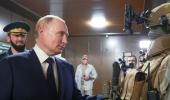India and Germany on Friday expressed the "deepest concern" over the prolonged war in Ukraine and its tragic humanitarian consequences, with Prime Minister Narendra Modi and Chancellor Olaf Scholz sharing the view that the "use or threat of use" of nuclear weapons in the context of the conflict is "unacceptable".

A joint statement issued by the ministry of external affairs after the two leaders co-chaired the seventh round of the India-Germany Inter-Governmental Consultations here said they also "unequivocally condemned" terrorism and violent extremism in all forms and manifestations.
"The leaders expressed their deepest concern over the war raging on in Ukraine, including its terrible and tragic humanitarian consequences. They reiterated the need for a comprehensive, just and lasting peace in line with international law, consistent with the purposes and principles of the UN Charter, including respect for sovereignty and territorial integrity," it said.
The leaders also noted the "negative impacts" of the war in Ukraine with regard to global food and energy security, especially for developing and least-developed countries.
"In the context of this war, they shared the view that the use, or threat of use, of nuclear weapons is unacceptable. They underscored the importance of upholding international law, and in line with the UN Charter, reiterated that all states must refrain from the threat of or use of force against the territorial integrity and sovereignty or political independence of any state," it added.
The 'Joint Statement: 7th India-Germany Inter-Governmental Consultations,' said Modi and Scholz also "unequivocally condemned the Hamas' terror attacks on October 7, 2023 and expressed concern over the large-scale loss of civilian lives and the humanitarian crisis in Gaza."
They called for the "immediate release of all hostages taken by Hamas and an immediate ceasefire" as well as the urgent improvement of access and sustained distribution of humanitarian assistance at scale throughout Gaza.
"The leaders underscored the need to prevent the conflict from escalating and spilling over in the region. In this regard, they called on all regional players to act responsibly and with restraint.
"Both sides also emphasised the urgent need to protect the lives of civilians and facilitate safe, timely and sustained humanitarian relief to civilians, and in this regard urged all parties to comply with international law," the joint statement said.
The leaders were also "deeply concerned" about the "rapidly deteriorating situation" in Lebanon, and called for an "urgent cessation of hostilities."
They agreed that a solution to the conflict in Gaza and in Lebanon can only be reached by diplomatic means.
The United Nations Security Council Resolution 1701 outlines the path towards a diplomatic solution along the Blue Line.
"The leaders reaffirmed their commitment to a negotiated two-state solution, leading to the establishment of a sovereign, viable and independent State of Palestine, living within secure and mutually recognised borders, side by side in dignity and peace with Israel, taking into account Israel's legitimate security concerns," the statement said.
The leaders underscored that as the world's two largest democracies, India and the European Union (EU) have a common interest in "ensuring security, prosperity and sustainable development in a multi-polar world."
"They emphasised the importance of deepening the India-EU Strategic Partnership, which would not only benefit both sides but also have a far-reaching positive impact globally," it said.
Modi and Scholz also called for concerted action against all terrorist groups, including those proscribed by the United Nations Security Council.
Both sides also called upon all countries to continue to work towards "eliminating terrorist safe havens" and infrastructure as well as to "disrupt terrorist networks and financing" in accordance with international law.
Modi and Scholz noted with concern the "emerging threats" from the use of new and emerging technologies for "terrorist purposes."
"Both sides are committed to promoting a free, open, inclusive, peaceful and prosperous Indo-Pacific built on international law, mutual respect for sovereignty, and peaceful resolution of disputes, and underpinned by effective regional institutions," the statement said.
Modi and Scholz reaffirmed their commitment to "further expand and deepen the Indo-German Strategic Partnership."
Both leaders underscored the importance of a comprehensive Free Trade Agreement, Investment Protection Agreement, and an Agreement on Geographical Indications between the European Union and India, and called for an "early conclusion of the negotiations".
India and Germany also agreed that the difficulties of the UNSC to effectively address regional and global crises offer a "compelling reminder" of the "urgent need for reform."
"As members of the 'Group of Four (G4)', India and Germany reiterated their call for a Security Council that is efficient, effective, transparent and reflective of the 21st century realities", it added.











 © 2025
© 2025